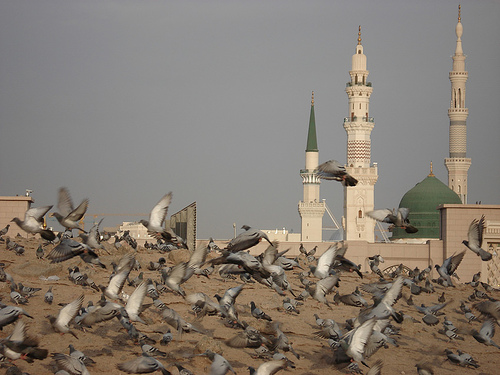
Prophet in Madinah
News of the Prophet’s departure from Makkah spread fast. Eagerly expecting his arrival,the Ansaars used to go out after morning prayers to the outskirts of the city and await his arrival until there was no more shade and the Sun became unbearable.
Then, as it was the hot season, they returned to their homes, sad and disappointed.
At last, the Prophet (r) arrived. The Ansaar had already returned to their houses but a Jew who happened to see him, cried aloud announcing his arrival.
Everybody rushed out to greet the Prophet (r) whom they found sitting beneath a tree with Abu Bakr (t) who was of like age.
Many of them had never seen the Prophet (r) and did not know which of the two was he. They crowded round both, but now, Abu Bakr realized their difficulty. He rose up, stood behind the Prophet (r) shielding him with a piece of cloth from the sun, and thus the doubts of the people dissipated.
More or less five hundred Ansaars rushed to pay their respects to the Prophet of Allah
(r); they requested him to enter the city, saying,
“Ride on! You two are safe and we shall obey you!”
The Prophet (r) went on, accompanied by his companions and the welcoming crowd.
The inhabitants of Madinah stood in front of their doors, the women lined up on the roofs inquiring one another about the Prophet (r). Anas said that he never came across a happier day in his life.
The people thronged in the way at their doors and windows and on the roofs of the houses. The slaves and lads cried excitedly, “Allahu-Akbar, the Prophet (r) of Allah is come!
Bara b. Azib, who was then in his youth, had said:
“I never saw the people of Madinah display warmth so great as the happiness they expressed on the arrival of the Prophet (r) of Allah where even the slave-girls were shouting that the Prophet (r) of Allah hath arrived!”
The faithful greeted the arrival of the Prophet (r) with the joyful cries of Allahu Akbar.
No other welcome wore that festive glance to gladden their hearts. Madinah appeared to be
jubilant and beaming into a smile.
The young maidens of Aus and Khazraj felt elated and sang in chorus:
“On the hillside whence caravans are given a sendoff, The full moon comes up this day. All the while Allah is praised, We had better return our thanks The Holy One, O You sent us, Yours has brought binding commands.
Anas b. Malik had not come of age when the Prophet (r) came to Madina. He was present on the occasion and he says,
“I never saw a day more graceful and radiant than the day when the Prophet(r) came to us.” (Darimi, On the authority of Anas)
PROPHET IN THE MOSQUE OF QUBA
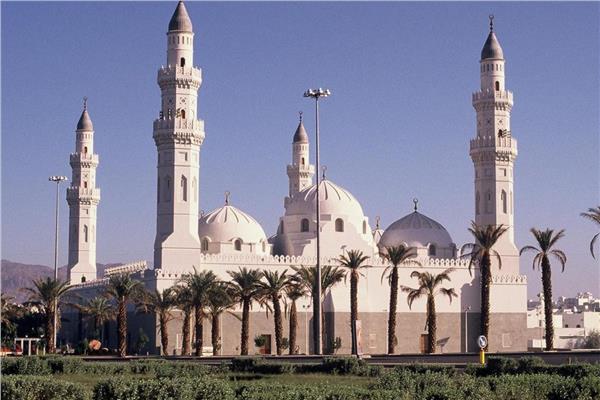
The Prophet (r) stayed for four days in Quba where he laid the foundation of a mosque.
He left Quba on Friday; the time for Friday prayers found him among the clan of Banu Salim b. ‘Auf where he performed the prayer in their mosque.
This was the first Friday prayer offered by the Prophet of Allah (r) in Medinah.
PROPHET IN THE HOUSE OF ABU AYYUB ANSAARI
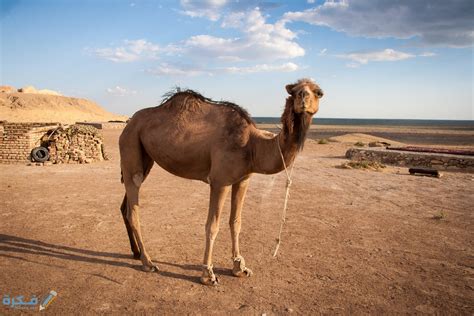
As the Prophet (r) rode through the streets of the city, people approached him in throngs with everyone offering to accommodate him in their homes.
They said,
“Live with us and enjoy our wealth, honor and protection.”
Sometimes they took hold o his camel’s halter, but he said to one and all:
“Let her go her way. She is guided by Allah.”
This happened more than once.
While the Prophet (r) was going through the locality of Bani an-Najjaar
the slave girls of the clan recited these verses to greet him:
“Daughters of Bani Najjaar we are, What luck! Muhammed is our neighbor!”
On reaching the house of Bani Malik b. an-Najjaar, the Prophets camel knelt by herself at
the place where now stands the gate of the Prophet’s mosque.
The place was then used for drying the dates and belonged to two orphan boys who were related to the Prophet (r) on his mother’s side.
The Prophet (r) alighted from his camel.
Abu Ayyub Khalid b. Zayd, who belonged to the clan of an-Najjaar, hastily unloaded the camel and took the luggage to his house.
Thus, the Prophet (r) stayed with Abu Ayyub, who paid him the greatest respect and did all he could to entertain the honored guests.
Abu Ayyub was loath even to live in the upper-story that he requested the Prophet (r) to occupy the place and came down with his family to live in the ground floor. The Prophet (r), however, said to him,
“O Abu Ayyub, it would be more convenient for me as well as those who come to see me if I stay in the lower portion.”
Abu Ayyub Ansaari was not a man of means, but he was extremely happy on having the prophet (r) as his guest.
He was beaming with joy at the great honor bestowed by Allah on him.
The loving regard he paid to the Prophet (r) was an indication of his genuine gratitude to Allah and the Prophet (r) himself.
“We used to prepare the evening meal for the Prophet (r) of Allah, says Abu Ayyub, “and send it to him.” We used to take only what wasleft.
Umm Ayyub and I took the food from beside the part that the Prophet (r) had eaten in order to partake in its blessings. In compliance with the Prophet’s preference, he lived in the ground floor, while we occupied the upper portion.
Once, we broke a jar of water whereby Umm Ayyub and I mopped up the water with the only robe we had for fear that it would drop on the Prophet (r) thereby causing him inconvenience.
Construction of the Prophet’s Mosque
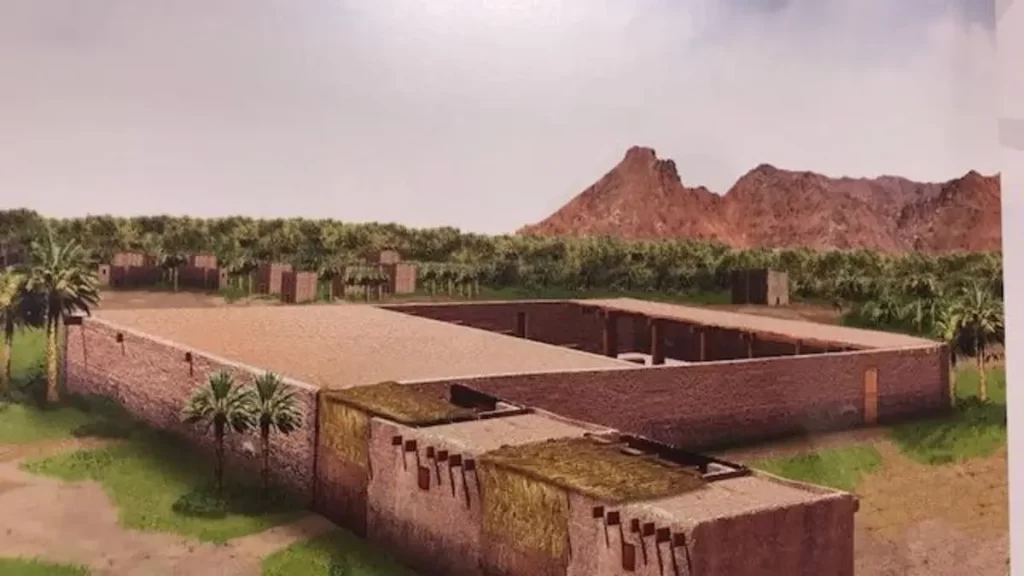
The Prophet (r) sent for the two boys who owned the date-store and asked them to name the price of the yard. They answered,
“Nay, but we shall make thee a gift of it, O Prophet (r) of Allah!”
The Prophet (r), however, refused their offer, paid them its price and built a mosque from there.
The Prophet (r) himself carried the unburned bricks for construction of the building along
with the other Muslims. He is reported to have recited as he worked.
“O Allah! The true reward is the reward of the hereafter, have mercy O Allah on the Ansaars and Mujajirun.”
Overjoyed to see the Messenger of Allah (r) invoking blessings on them, the Muslims,too,sang and thanked Allah. The Prophet (r) lived in the house of Abu Ayyub Ansaari for seven months. (Ibn Kathir, Vol. II, p. 279)
In the meantime, the construction of the mosque and dwelling place for the Prophet’s family was already completed and so he moved to live in his house.
The Muslims who had been restrained from migration by the polytheist of Makkah, continued to emigrate to Madinah until the only ones left there were those who were either forcibly detained or had apostatized.
On the other hand, not a house of Ansaar was left without the people having sworn allegiance to Allah and His Prophet (r).
BONDS OF BROTHERHOOD BETWEEN THE ANSAARS AND MUHAAJIRUN

The Prophet (r) established bonds of brotherhood between the Muhaajirun and the Ansaar putting them under an agreement and obligation to mutual welfare, benevolence and assistance. Each Ansaari took a Muhaajir brother.
The former sometimes went so far as to give his Muhaajir brother half of whatever he possessed in the form of houses, assets, lands and groves. Such was the enthusiasm of the Ansaars to share everything with their brothers-in-faith that they divided everything into two parts to draw lots for allocating their share. In most cases, they tried to give the Muhaajirun the fairer portion of their property.
An Ansaari would say to his Emigrant brother
“Behold, I shall divide my possessions into two halves.”
The Muhaajir, who was often an expert in commerce, would refuse and would answer,
“May Allah bless you in your family and your possessions! Just inform me of where the
market is?”
The Ansaar were magnanimous and self-denying and the Muhaajir forbearing, selfreliant.”
COVENANT BETWEEN THE MUSLIMS AND THE JEWS

Shortly thereafter, the Prophet (r) got a written document, which bound the Muhaajirun and the Ansaars to a friendly agreement. The covenant made the Jews a party to the treaty that guaranteed them the freedom of their rights and obligations.
THE CALL TO PRAYER
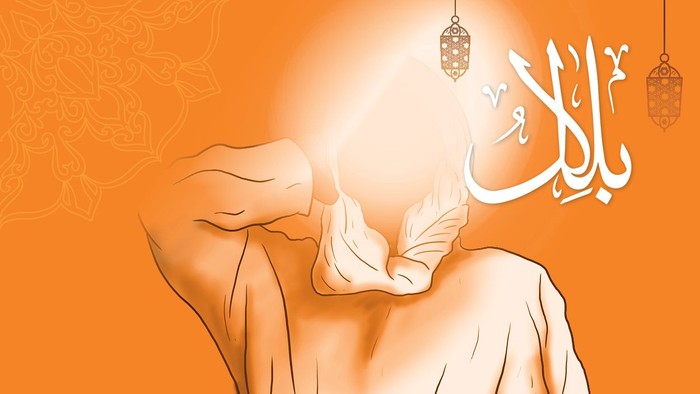
After the Prophet (r) had settled down and Islam was deeply entrenched in the soil of Madinah,
the mode of calling the faithful to prayer caught the attention of the Prophet (r).
He disliked the customs being employed by the Jews and Christians such as kindling fire or the use of bell and horn to summon the people to such a spiritual obligation.
Initially, the Muslims used to come by themselves for prayer at the scheduled time without any announcement or call at all. While different proposals were being considered, Allah guided the Muslims to the method of giving the call to prayer.
A number of companions had a vision of the call in their dreams, which was approved by the Prophet (r) and prescribed as the official procedure of assembling the Muslims for such a worship act. Bilal Ibn Rabah (may Allah be pleased with him) was entrusted by the Prophet (r) to give the call to prayer and thus he came to be known as the muadhin of the Prophet (r) and the leader of all those who would call the faithful to prayer ‘till the end of time.
for prophets stories visit https://sunofislam.com/prophetsofgod/
for scientific miracles articles visit www.sunofislam.com
